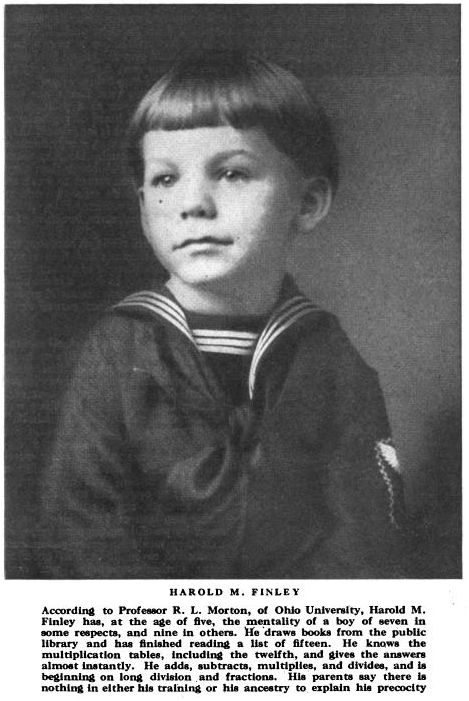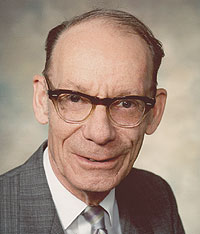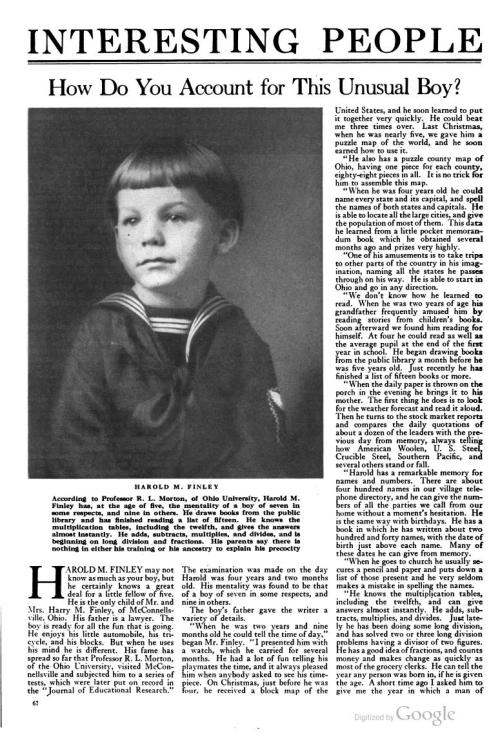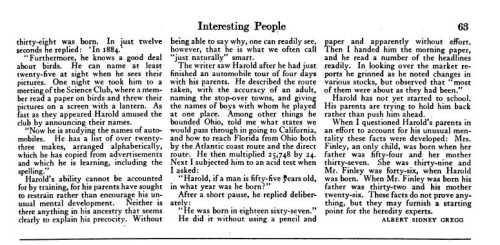From a 1922 issue of The American Magazine:
How Do You Account for This Unusual Boy?
Harold M. Finley may not know as much as your boy, but he certainly knows a great deal for a little fellow of five. He is the only child of Mr. and Mrs. Harry M. Finley, of McConnellsville, Ohio. His father is a lawyer. The boy is ready for all the fun that is going. He enjoys his little automobile, his tricycle, and his blocks. But when he uses his mind he is different. His fame has spread so far that Professor R. L. Morton, of the Ohio University, visited McConnellsville and subjected him to a series of tests, which were later put on record in the “Journal of Educational Research.”
The examination was made on the day Harold was four years and two months old. His mentality was found to be that of a boy of seven in some respects, and nine in others.
The boy’s father gave the writer a variety of details.
“When he was two years and nine months old he could tell the time of day,” began Mr. Finley. “I presented him with a watch, which he carried for several months. He had a lot of fun telling his playmates the time, and it always pleased him when anybody asked to see his timepiece. On Christmas, just before he was four, he received a block map of the United States, and he soon learned to put it together very quickly. He could beat me three times over. Last Christmas, when he was nearly five, we gave him a puzzle map of the world, and he soon earned how to use it.
“He also has a puzzle county map of Ohio, having one piece for each county, eighty-eight pieces in all. It is no trick for him to assemble this map.
“When he was four years old he could name every state and its capital, and spell the names of both states and capitals. He is able to locate all the large cities, and give the population of most of them. This data he learned from a little pocket memorandum book which he obtained several months ago and prizes very highly.
“One of his amusements is to take trips to other parts of the country in his imagination, naming all the states he passes through on his way. He is able to start in Ohio and go in any direction.
“We don’t know how he learned to read. When he was two years of age his grandfather frequently amused him by reading stories from children’s books. Soon afterward we found him reading for himself. At four he could read as well as the average pupil at the end of the first year in school. He began drawing books from the public library a month before he was five years old. Just recently he has finished a list of fifteen books or more.
“When the daily paper is thrown on the porch in the evening he brings it to his mother. The first thing he does is to look for the weather forecast and read it aloud. Then he turns to the stock market reports and compares the daily quotations of about a dozen of the leaders with the previous day from memory, always telling how American Woolen, U. S. Steel, Crucible Steel, Southern Pacific, and several others stand or fall.
“Harold has a remarkable memory for names and numbers. There are about four hundred names in our village telephone directory, and he can give the numbers of all the parties we call from our home without a moment’s hesitation. He is the same way with birthdays. He has a book in which he has written about two hundred and forty names, with the date of birth just above each name. Many of these dates he can give from memory.
“When he goes to church he usually secures a pencil and paper and puts down a list of those present and he very seldom makes a mistake in spelling the names.
“He knows the multiplication tables, including the twelfth, and can give answers almost instantly. He adds, subtracts, multiplies, and divides. Just lately he has been doing some long division, and has solved two or three long division problems having a divisor of two figures. He has a good idea of fractions, and counts money and makes change as quickly as most of the grocery clerks. He can tell the year any person was born in, if he is given the age. A short time ago I asked him to give me the year in which a man of thirty-eight was born. In just twelve seconds he replied: ‘In 1884.’
“Furthermore, he knows a good deal about birds. He can name at least twenty-five at sight when he sees their pictures. One night we took him to a meeting of the Science Club, where a member read a paper on birds and threw their pictures on a screen with a lantern. As fast as they appeared Harold amused the club by announcing their names.
“Now he is studying the names of automobiles. He has a list of over twenty-three makes, arranged alphabetically, which he has copied from advertisements and which he is learning, including the spelling.”
Harold’s ability cannot be accounted for by training, for his parents have sought to restrain rather than encourage his unusual mental development. Neither is there anything in his ancestry that seems clearly to explain his precocity. Without being able to say why, one can readily see, however, that he is what we often call “just naturally” smart.
The writer saw Harold after he had just finished an automobile tour of four days with his parents. He described the route taken, with the accuracy of an adult, naming the stop-over towns, and giving the names of boys with whom he played at one place. Among other things he bounded Ohio, told me what states we would pass through in going to California, and how to reach Florida from Ohio both by the Atlantic coast route and the direct route. He then multiplied 25,748 by 24. Next I subjected him to an acid test when I asked:
“Harold, if a man is fifty-five years old, in what year was he born?”
After a short pause, he replied deliberately:
“He was born in eighteen sixty-seven.”
He did it without using a pencil and paper and apparently without effort. Then I handed him the morning paper, and he read a number of the headlines readily. In looking over the market reports he grinned as he noted changes in various stocks, but observed that “most of them were about as they had been.”
Harold has not yet started to school. His parents are trying to hold him back rather than push him ahead.
When I questioned Harold’s parents in an effort to account for his unusual mentality these facts were developed: Mrs. Finley, an only child, was born when her father was fifty-four and her mother thirty-seven. She was thirty-nine and Mr. Finley was forty-six, when Harold was born. When Mr. Finley was born his father was thirty-two and his mother twenty-six. These facts do not prove anything, but they may furnish a starting point for the heredity experts.
— Albert Sidney Gregg
And this is someone we have a record of outside of this magazine!
Harold excelled through high school and left home at 13 to attend Northwestern University on a scholarship. He graduated cum laude at 17, in the top four of his class with a degree in economics. TIME magazine ran a story and photo of Harold on March 27, 1933, two months before his graduation.
At age 19, Harold became one of the youngest registered New York Stock Exchange representative ever.
Original page images (second is partial page), click to enlarge:




